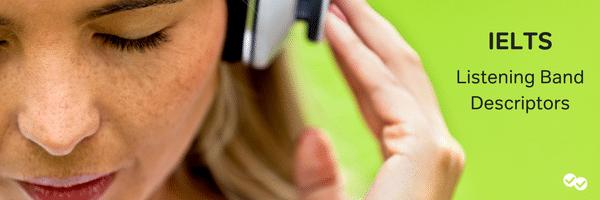
IELTS Speaking scores are based entirely on your response’s band descriptors. So when you’re trying to level up, or raise your IELTS Speaking score, the first thing you should do is to look at the IELTS Speaking rubric to review the IELTS Speaking band descriptors. By looking at the category descriptions and truthfully evaluating your current abilities, you’ll set yourself up for success.
We’ll be right there with you: in this post, we’ll highlight the most important elements of the IELTS Speaking band descriptors, describing them in understandable terms. We’ll also point you in the direction of additional resources you can use to boost your Speaking band descriptor!
Table of Contents
What are the IELTS Speaking band descriptors?
In short, Speaking band descriptors are the IELTS Speaking criteria that your examiner uses to give you a score. They are a way of ensuring that each response at a certain score meets the same quality standards. Specifically, you’ll be evaluated on Fluency and Coherence, Lexical Resource, Grammatical Range and Accuracy, and Pronunciation. Here’s what each of these means in-depth!
1. Fluency and Coherence
Fluency and Coherence involve communicating comfortably, confidently, and clearly in English. The main thing to keep in mind regarding your fluency score is that it measures how well you can focus on the message you want to convey rather than the language you need to express it. Coherence measures how well your ideas create a logical whole. Jumping around from one point to the next will keep you at a lower band score in IELTS Speaking.
Find out more about Fluency and Coherence on IELTS Speaking!
2. Lexical Resource
This scoring category measures vocabulary and your ability to use words with accurate meaning in an appropriate context. As we’ve already seen, IELTS Speaking rewards test-takers with large vocabularies indirectly in Fluency & Coherence—but it rewards them directly in Lexical Resource. To learn more, read our tips and tricks immediately below, and check out our complete guide to IELTS Speaking Lexical Resource.
Find out more about Lexical Resource on IELTS Speaking!
3. Grammatical Range and Accuracy
Yes, your grammar will also be assessed on the Speaking exam. Keep in mind that your grammatical score range is not simply based on your avoidance of grammatical mistakes. It’s true that limiting errors is important. On the other hand, you can only reach a very high Speaking band score if you can also demonstrate that you have mastered complex sentence structures, verb tenses, and other advanced grammatical features.
In addition to Magoosh’s guide to Grammatical Range and Accuracy for IELTS Speaking, here are some tips for scoring well in this component of the Speaking rubric:
Find out more about Grammatical Range and Accuracy on IELTS Speaking!
4. Pronunciation
For most students, this is a very difficult category in which to make improvements, especially if you only have a short time to prepare before the exam. On the other hand, it can be worthwhile to focus on pronunciation if your speech is very difficult for English speakers to understand.
For a deeper look at this rubric category, see our post that focuses on Pronunciation from the IELTS Speaking rubric.
![]()
How are the IELTS Speaking band descriptors used by examiners?
On your official exam, your examiner will evaluate how you perform in each of these four categories. Then, they will give you a band score from 0 to 9 (lowest to highest) in each of these four categories based on the IELTS Speaking marking criteria on the rubric. The average of these ratings is your overall band score for that task.
What do the Speaking band descriptors mean?
Each band score has a particular meaning for your English abilities. For example, a band score of 9 in Speaking means that your English is “fully operational,” and that you can make appropriate and varied choices regarding grammar, vocabulary, and punctuation.
The scores go down to 1, for “non-user,” meaning that the examinee does not speak enough English to be understood. (Note that if you try to answer the question, you will not receive a 0; the lowest score, if you are on-topic, is at least 1).
For more on the meaning of each Speaking band descriptors, check out How to Estimate Your IELTS Band Score.
IELTS Speaking: How to Score a Band 8
Getting an IELTS Speaking band score of 8 is an impressive feat. This places you as a “very good user” of English. So how do you get this score? Check out this advice from one of Magoosh’s IELTS experts, Eliot!
Additional Resources
While leveling up even half a band score can seem impossible, it’s not—and it can make all the difference! Going from an IELTS Speaking score of 6.5 to 7, for example, puts you in the high-scoring range. So while it takes lots of hard work and study, know that it is possible to level up and that you can get the IELTS score you need by focusing on the IELTS Speaking band descriptors, levels, and IELTS speaking score system criteria.
Unsure where to start? No problem! Here are some resources to check out.
- Find out what types of questions you’ll face by learning about IELTS Speaking Topics.
- Set your score goals by taking a look at What Is a Good IELTS Score?
- Discover how your Speaking score affects your IELTS score overall with the IELTS score calculator.
- Get all of the resources you need from this page on IELTS Speaking.
- Understand your current abilities by testing them with this Speaking diagnostic quiz.
- Improve your IELTS Speaking band score with these top IELTS Speaking tips!





